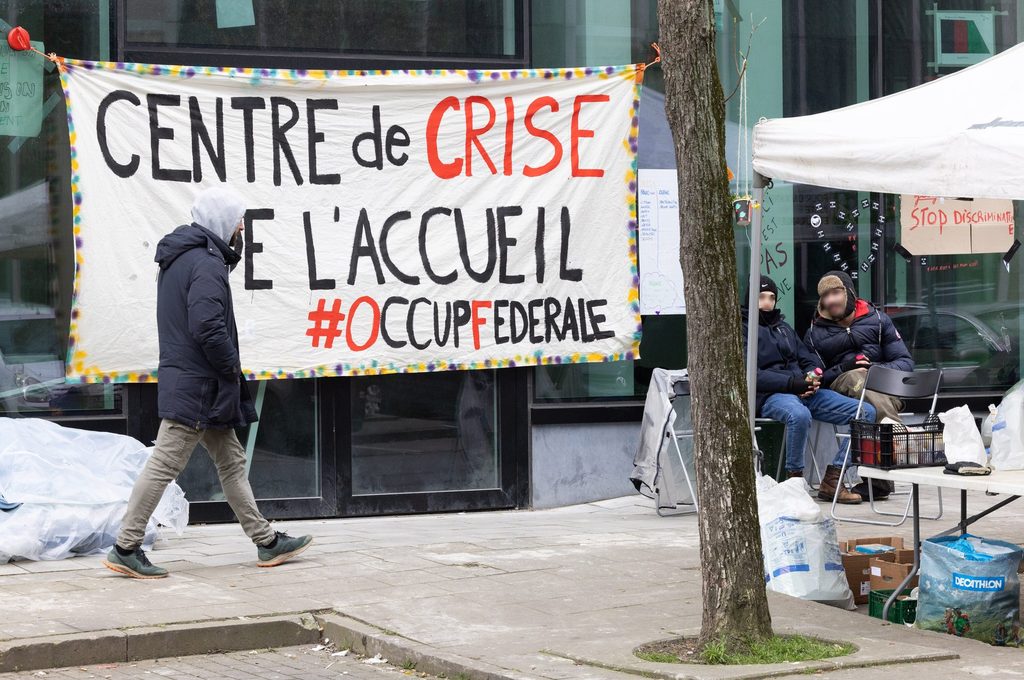Both the Belgian state and Fedasil have been condemned by various courts for their mishandling of the reception crisis, but the latest verdict by the tribunal of first instance has been deemed the most powerful to date.
For almost two years, Belgium has been failing to provide asylum seekers with legally-entitled shelter, resulting in thousands, including children, sleeping rough. The Belgian State was first condemned by a Brussels Court for failing to fulfil its obligations to asylum seekers after a catalogue of failures, in January 2022, and has since been convicted thousands of times.
Last week, a ruling by the French-speaking court of the first instance in Brussels was added to this list. It condemned the Belgian State and Fedasil for violating the right to asylum and the right to shelter, ruling in favour of civil society organisations that brought the case.
"This is the most powerful verdict to date. The court confirms what we have been arguing for a long time," said Tine Claus, Director of Refugee Work Flanders (Vluchtelingenwerk Vlaanderen), which supported the case.
No unforeseeable event
In its defence, the Belgian state invoked the principle of force majeure to argue that it cannot fulfil its obligation due to a high influx, difficulties in opening new reception centres and the war in Ukraine.
While acknowledging the State's efforts and the challenges faced, the court ruled that the influx has always been a volatile figure and these fluctuations are not inevitable or unpredictable, meaning the force majeure argument is not valid. "The government is simply not doing enough to solve the reception crisis," Claus said.
Tweet translation: "The court confirms what we have been arguing for a long time: there is no force majeure, the government is simply not doing enough to solve this reception crisis."
The court added that the measures taken by Belgium to tackle the crisis were not sufficient (to fulfil international obligations), which affirms the NGOs claims that there is a lack of political will by the Belgian State. "Indeed, there are several options in the Reception Act that remain unused for now," Claus noted.
In her response to the ruling, State Secretary for Asylum and Migration Nicole de Moor argued that she has never stopped looking for reception places and is still committed to this together with Fedasil, adding that she is also pushing for longer-term structural solutions, however, these efforts have barely born fruit.
Sending strong signals
The court was also critical of the attitude of the Belgian state towards previous convictions.
Several courts have already imposed penalty payments but the government consistently refuses to pay these penalty payments, arguing this would worsen its financial situation and harm the interests of asylum seekers. The court refuted this excuse, saying this instead endangers the foundations of the rule of law.

Refugees and protesters donning masks with politicians' faces on them on the balcony of the newly occupied building. Credit: Belga/ Justin Namur
The verdict also indicated that Belgium itself must take full responsibility for its own actions and not shift part of the responsibility away from itself to the judiciary.
Claus noted that she hopes this conviction will result in the government "coming to its senses and addressing this illegal situation by giving asylum seekers back a dignified existence and restoring the rule of law, but questioned what will happen if the government ignores this ruling again.
"What does this mean for the separation of powers? And what signal is the government sending to its citizens with this? The longer this situation drags on, the more important this question becomes," Claus concluded.

